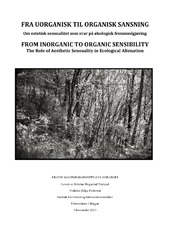| dc.contributor.author | Træland, Kristine Hognerud | eng |
| dc.date.accessioned | 2013-09-09T09:24:33Z | |
| dc.date.available | 2013-09-09T09:24:33Z | |
| dc.date.issued | 2013-05-22 | eng |
| dc.identifier.uri | https://hdl.handle.net/1956/7073 | |
| dc.description.abstract | The purpose of this Master-degree dissertation is to investigate the relationship between contemporary sensibility and our approach towards nature. Is there any connection between the experience of our own body and the environmental crisis present in our time? The thesis presents the Italian philosopher Mario Perniolas analysis of sensing and feeling in contemporary time, including his suggestion of concepts such as “sensology”,”mediacracy” and “inorganic sensibility”. His theory describes a reification process where our feelings has been socialized and mediated leaving us with indirect and passive experiences. Presenting Perniolas theory in relation to media technology and a new culture of virtual participation, this paper aims to show how the theory of emancipation from a direct and referential experience coincides with a bigger picture of inattention towards not only our physical body, but also our physical resources and environment. Through a study of the concept of alienation, the implications of a distance towards the physical world will be discussed. Since concepts such as “nature” and “alienation” are difficult to justify within a postmodern tradition, the approach chosen to meet with indifference and relativity is the impossibility of unawareness towards what is argued to be both bodily and environmental organic limits. When making a comparison between ecological imbalance and human lifestyle diseases, it seems that corporeal presence appears here to provide grounding for both normative critique and closer consideration of ecological vulnerability. Instead of making nature into an “idea” of something to be saved, it will be argued how corporeal understanding of what it means to be nature, seem to be a strategy for both an environmental and a “bodily ecology”. The socialization of sensing and feeling will also be put in relation to what Felix Guattari describes as a process of homogenization common of both biological diversity and human singularities. Within this extended concept of transversal ecology, is suggested a connection between our ecological problems and a more general crisis of social imagination and solidarity. In response to subjectivization and an atmosphere of passivity, what seems to be required is an aesthetic orientation towards a reactivation of the corporeal presence by a sensuous body. Where the inorganic sensing according to Mario Perniolas definitions represents the “opposite of pleasure”, an organic sensibility seems on the contrary to be a reactivation of pleasure in bodily presence. A capacity of sensuous presence and involvement towards the other, which like the concept of the rhizome is singularized but still connected. | en_US |
| dc.description.abstract | Oppgaven presenterer den italienske filosofen Mario Perniolas begrep om uorganisk sansning" og setter dette i sammenheng med annen sentral tenking rundt subjektivering og menneskelige vilkår i senmoderne tid. Videre blir begrepet forsøkt satt i sammenheng med en kultur stadig mer preget av virtuell og medieteknologisk deltakelse. Spørsmålet som stilles er hvorvidt vår tids distansering fra det kroppslige kan ses i sammenheng med en mer generell manglende aktelse i møte med naturens sårbarhet. Gjennom en vurdering av begrepet om fremmedgjøring blir implikasjonene fra en slik distanse diskutert, for deretter å presentere en estetisk orientering som et alternativ i retning av en annen type sansning, tettere knyttet til en organisk forståelse av mennesket. | en_US |
| dc.format.extent | 1206197 bytes | eng |
| dc.language.iso | nob | eng |
| dc.publisher | The University of Bergen | eng |
| dc.title | Fra uorganisk til organisk sansning. Om estetisk sensualitet som svar på økologisk fremmedgjøring | eng |
| dc.title.alternative | From Inorganic to Organic Sensibility. The Role of Aesthetic Sensuality in Ecological Alienation | eng |
| dc.type | Master thesis | |
| dc.date.updated | 2013-09-09T09:13:01Z | |
| dc.rights.holder | Copyright the author. All rights reserved | |
| dc.description.degree | Master i Filosofi | |
| dc.description.localcode | MAHF-FILO | |
| dc.description.localcode | FILO350 | |
| dc.subject.nus | 713505 | eng |
| fs.subjectcode | FILO350 | |
